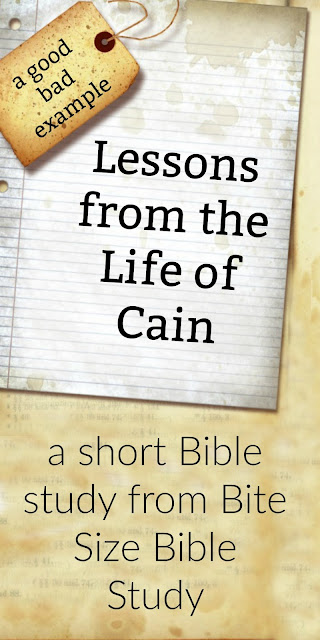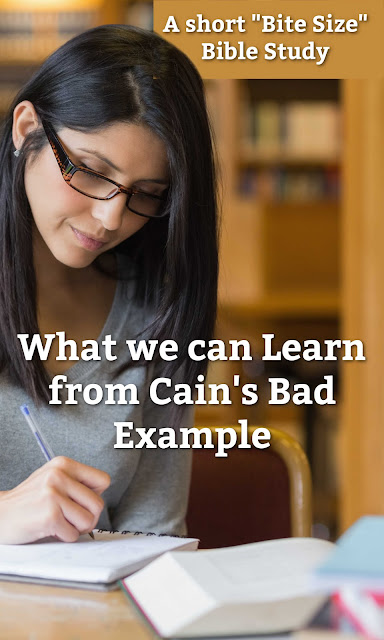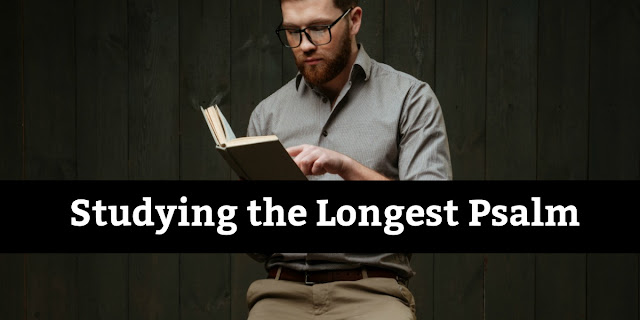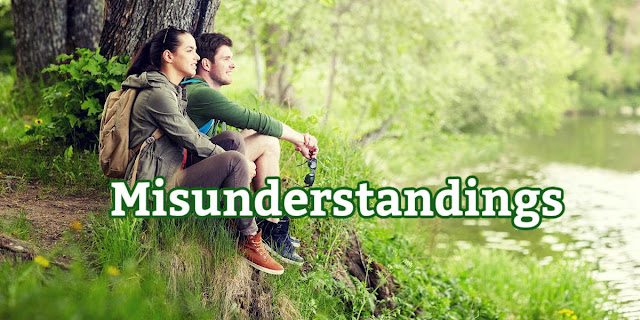I encourage you to take some time and work through this study thoughtfully. Because it's longer than most Bite Size Bible Studies, I encourage you to do it with a friend or small group, dividing the questions and resources...
I encourage you to take some time and work through this study thoughtfully. Because it's longer than most Bite Size Bible Studies, I encourage you to do it with a friend or small group, dividing the questions and resources to fit your schedules.
Before doing this study, please read Cain Provides a Good Bad Example—an Example to Avoid. It explains that Christians don't have the spirit of Cain because he belonged to Satan (1 John 3:12), but we can exhibit some “Cainish" behavior if we aren't daily examining ourselves. So let's take a deeper look at Genesis 4:
? Cain was religious.
2 “Now Abel kept flocks, and Cain worked the soil. 3 In the course of time Cain brought some of the fruits of the soil as an offering to the Lord. 4 And Abel also brought an offering—fat portions from some of the firstborn of his flock. The Lord looked with favor on Abel and his offering, 5 but on Cain and his offering he did not look with favor.”
Abel shed blood for his sacrifice, and later in Scripture God revealed that there is no forgiveness of sin without the shedding of blood. (See Leviticus 4 and Hebrews 9:22.) The Old Testament sacrifices didn't actually provide forgiveness, but the New Testament sacrifice of Christ did. (See Hebrews 10:1-18.)
5 “So Cain was very angry, and his face was downcast. 6 Then the Lord said to Cain, ‘Why are you angry? Why is your face downcast? 7 If you do what is right, will you not be accepted? But if you do not do what is right, sin is crouching at your door; it desires to have you, but you must rule over it.’”
This is a common human problem—we mess up, but we blame God for the consequences of our sins.
8 “Now Cain said to his brother Abel, ‘Let’s go out to the field.’ While they were in the field, Cain attacked his brother Abel and killed him.”
9 “Then the Lord said to Cain, ‘Where is your brother Abel?’ ‘I don’t know,’ he replied. ‘Am I my brother’s keeper?’ 10 The Lord said, ‘What have you done? Listen! Your brother’s blood cries out to me from the ground. 11 Now you are under a curse and driven from the ground, which opened its mouth to receive your brother’s blood from your hand. 12 When you work the ground, it will no longer yield its crops for you. You will be a restless wanderer on the earth.’”
Copyright, 2014, BiteSizeBibleStudy, edited and updated 2023
1. Cain's attitudes present in Genesis 4 (Scripture in italics)
? Cain was religious.
2 “Now Abel kept flocks, and Cain worked the soil. 3 In the course of time Cain brought some of the fruits of the soil as an offering to the Lord. 4 And Abel also brought an offering—fat portions from some of the firstborn of his flock. The Lord looked with favor on Abel and his offering, 5 but on Cain and his offering he did not look with favor.”
Abel shed blood for his sacrifice, and later in Scripture God revealed that there is no forgiveness of sin without the shedding of blood. (See Leviticus 4 and Hebrews 9:22.) The Old Testament sacrifices didn't actually provide forgiveness, but the New Testament sacrifice of Christ did. (See Hebrews 10:1-18.)
God never punishes without cause, so God must have first communicated what was an appropriate offering and Cain ignored Him. Or Cain brought his offering with the wrong motives. Perhaps he knew Abel was preparing to make an offering, and he hurried to make his first out of jealousy and competition with Abel, not out of love for God.
? Cain got angry with God.
? Cain got angry with God.
5 “So Cain was very angry, and his face was downcast. 6 Then the Lord said to Cain, ‘Why are you angry? Why is your face downcast? 7 If you do what is right, will you not be accepted? But if you do not do what is right, sin is crouching at your door; it desires to have you, but you must rule over it.’”
This is a common human problem—we mess up, but we blame God for the consequences of our sins.
Note that God came to Cain and discussed it with him. And God clearly explained that Cain was dealing with sin and Cain could choose to do the right thing. This is true for all of us.
8 “Now Cain said to his brother Abel, ‘Let’s go out to the field.’ While they were in the field, Cain attacked his brother Abel and killed him.”
Adam and Eve parented both Cain and Abel. God gave Cain and Abel the same opportunities. But Cain chose to sin and turn from God. Our direction in life is based more on our personal choices than any factors of environment or heredity.
? Cain mocked God and lied to God.
? Cain mocked God and lied to God.
9 “Then the Lord said to Cain, ‘Where is your brother Abel?’ ‘I don’t know,’ he replied. ‘Am I my brother’s keeper?’ 10 The Lord said, ‘What have you done? Listen! Your brother’s blood cries out to me from the ground. 11 Now you are under a curse and driven from the ground, which opened its mouth to receive your brother’s blood from your hand. 12 When you work the ground, it will no longer yield its crops for you. You will be a restless wanderer on the earth.’”
Do you sense the irony in this conversation? A man who has just killed his brother asks a flippant, rhetorical question meaning “I'm not responsible for my brother.”
? Cain blamed God.
? Cain blamed God.
13 “Cain said to the Lord, ‘My punishment is more than I can bear. 14 Today you are driving me from the land, and I will be hidden from your presence; I will be a restless wanderer on the earth, and whoever finds me will kill me.’ 15 But the Lord said to him, ‘Not so; anyone who kills Cain will suffer vengeance seven times over.’ Then the Lord put a mark on Cain so that no one who found him would kill him. 16 So Cain went out from the Lord’s presence and lived in the land of Nod, east of Eden.
Cain's only concern is for himself. He feels his punishment is too harsh, but what about the “punishment” he inflicted on his brother? True repentance always involves sorrow for the sin and for those hurt by the sin. False repentance involves only sorrow for the personal consequences.
2. New Testament insights on the story of Cain
Hebrews 11:4 – “By faith Abel brought God a better offering than Cain did. By faith he was commended as righteous, when God spoke well of his offerings. And by faith Abel still speaks, even though he is dead.”
2. New Testament insights on the story of Cain
Hebrews 11:4 – “By faith Abel brought God a better offering than Cain did. By faith he was commended as righteous, when God spoke well of his offerings. And by faith Abel still speaks, even though he is dead.”
Abel didn't die in vain. His death has been speaking to mankind for thousands of years.
1 John 3:12 – “Do not be like Cain, who belonged to the evil one and murdered his brother. And why did he murder him? Because his own actions were evil and his brother’s were righteous.”
1 John 3:12 – “Do not be like Cain, who belonged to the evil one and murdered his brother. And why did he murder him? Because his own actions were evil and his brother’s were righteous.”
I appreciate when the New Testament offers divine light on portions of the Old Testament. From this verse, we clearly understand Cain's motives and his destiny.
Jude 1:11 – “Woe to them! They have taken the way of Cain; they have rushed for profit into Balaam’s error; they have been destroyed in Korah’s rebellion.”
Jude 1:11 – “Woe to them! They have taken the way of Cain; they have rushed for profit into Balaam’s error; they have been destroyed in Korah’s rebellion.”
Hopefully, this study will encourage us to avoid the "way of Cain."
For additional study, I encourage you to read through each of these one-minute devotions. You'll find some repetition, but that's a good way to reinforce Bible principles:
For additional study, I encourage you to read through each of these one-minute devotions. You'll find some repetition, but that's a good way to reinforce Bible principles:
Bite Size Bible Study














